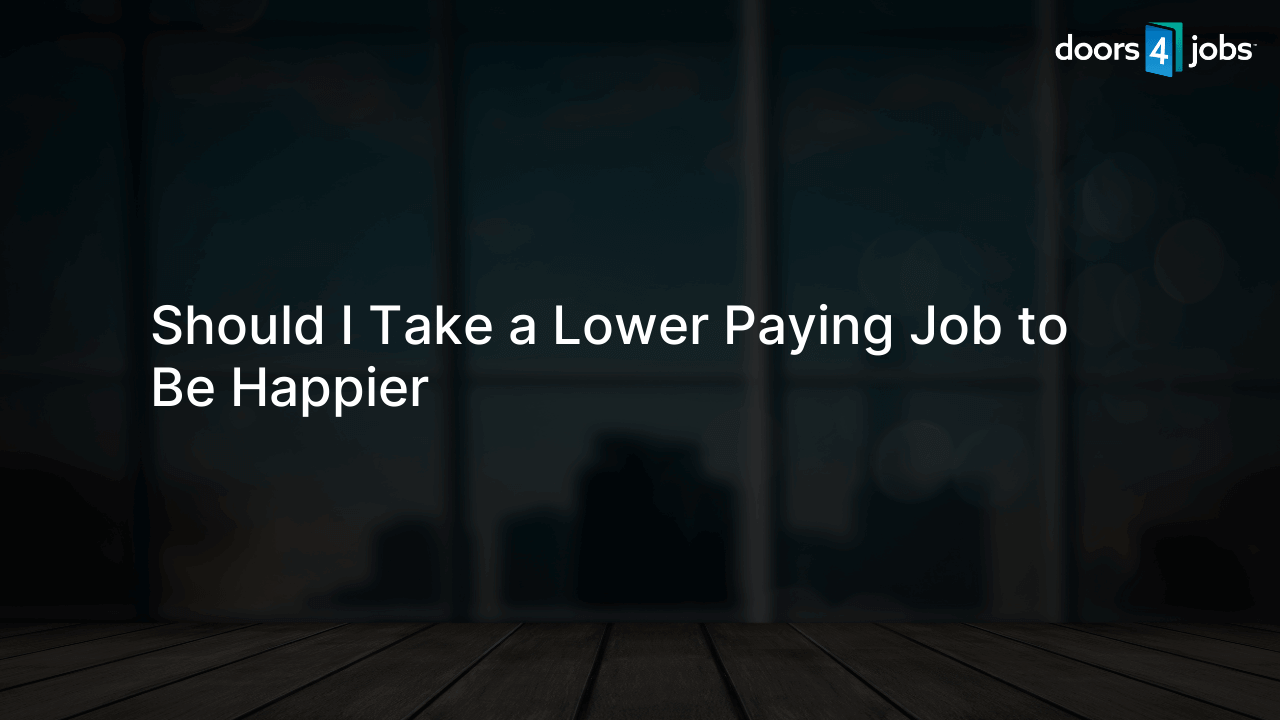Yes, taking a lower paying job to be happier is a valid choice if the trade-off between financial benefits and personal well-being is worth it. Consider factors such as job fulfillment, work-life balance, and long-term career goals to determine if the benefits will outweigh the loss in income.
Evaluating Job Fulfillment and Happiness
When considering a lower paying job for happiness, assess your current and potential job satisfaction levels. Work satisfaction elements include factors such as the role’s nature, growth opportunities, and a feeling of purpose. Evaluate how each job aligns with your core values and passions, and determine which role offers better overall happiness.
Analyzing Work-Life Balance
Work-life balance plays a critical role in overall happiness. Will the lower paying job provide more opportunities for personal time, a flexible schedule, or reduced stress levels? Compare both job situations and decide if the work-life balance in the lower paying position would significantly improve your quality of life.
Family and Social Life
Consider your priorities in terms of family and social life. A lower paying job with less pressure and more time for family and friends might contribute to a happier lifestyle.
Considering Long-Term Career Goals
Identify the impact of taking a lower paying job on your long-term career goals. In some cases, a lower paying job might offer valuable experience or networking opportunities that can lead to future growth. Alternatively, consider whether staying on your current career path might lead to higher potential earning or satisfaction in the future.
Growth and Promotion Opportunities
Ponder the professional development and promotion opportunities in both positions. A lower paying job that promotes growth and learning might benefit your career and happiness in the long run.
Financial Implications
Before deciding to take a lower paying job to be happier, weigh the immediate and long-term financial consequences. Assess your financial needs and determine if you can afford to take a pay cut without compromising your lifestyle, savings goals, or debt-payoff plans.
Budget Adjustment
Consider implementing a new budget plan or make lifestyle adjustments to accommodate the reduced income without sacrificing overall happiness.
Conclusion
Ultimately, your happiness and well-being are vital factors when deciding on a career move. Assess the relevant aspects, weigh the pros and cons, and make a well-informed decision that aligns with your values, goals, and financial needs.
Mental Health and Job Stress
Research the impact of stress on your mental health, and analyze the stress levels in your current job compared to the lower paying job. A less stressful work environment might contribute significantly to overall happiness and well-being, improving mental health and preventing burnout.
Company Culture and Environment
Investigate the company culture and environment of the lower paying job. An inclusive, supportive, and positive workplace culture can influence personal happiness and job satisfaction, making it a vital factor to consider during your decision-making process.
Commuting and Location
Consider the effects of the job location and commuting time on your day-to-day life. A lower paying job with a shorter commute or the option to work remotely may improve your work-life balance, helping you achieve greater personal satisfaction and happiness.
Job Security and Stability
When deciding to take a lower paying job for happiness, assess the job security and future stability of both job positions. A more stable job, even if it pays less, might be a source of greater peace of mind and happiness, particularly during uncertain economic times.
Additional Benefits and Perks
Examine any additional benefits or perks that the lower paying job may offer. These can include healthcare coverage, retirement or pension plans, and employee discounts. Evaluate the overall value of these benefits and their potential contributions to your overall happiness and well-being.
Voluntary Simplicity and Financial Freedom
Consider exploring voluntary simplicity – embracing a minimalist lifestyle with fewer financial burdens. A lower paying job can often align better with this lifestyle, allowing you to focus on the aspects of life that contribute to happiness more than material wealth.
Consulting a Mental Health Professional
If you struggle to make a decision or cope with job dissatisfaction, speaking to a licensed mental health professional can provide guidance and support. A counselor or therapist can help you better understand your emotions and assist in navigating difficult career decisions with your mental well-being in mind.
FAQ Section
Here are some frequently asked questions and their answers to help you better understand the factors to consider when deciding whether to take a lower paying job for happiness.
What aspects should I consider when evaluating job satisfaction?
Consider factors such as the role’s nature, growth opportunities, a sense of purpose, alignment with your core values and passions, work environment, and company culture when evaluating job satisfaction and overall happiness.
How can I determine if the lower-paying job provides a better work-life balance?
Assess the work hours, flexibility, anticipated stress levels, and the role’s impact on personal time, family, and social life. Determine if the lower paying job allows for better balance and has a significant positive effect on your overall quality of life.
What are the financial implications of taking a lower paying job and how can I prepare for them?
Taking a lower paying job can affect your income, savings, and debt-payoff plans. Before making a decision, evaluate your financial needs, create a new budget plan, or consider lifestyle adjustments to accommodate the reduced income without sacrificing happiness.
How can I determine if the lower-paying job is worth it for my long-term career goals?
Consider factors such as professional development, promotion opportunities, valuable experiences, and networking potentials offered by the lower paying position. A job that aligns better with your long-term goals and enables personal and professional growth can justify the reduced income.
Is it essential to consider mental health and job stress when deciding between jobs?
Yes, mental health and job stress play a significant role in your overall well-being. Less stressful work environments can help maintain good mental health and prevent burnout. When deciding whether to take a lower paying job, consider its potential impact on your mental well-being.











